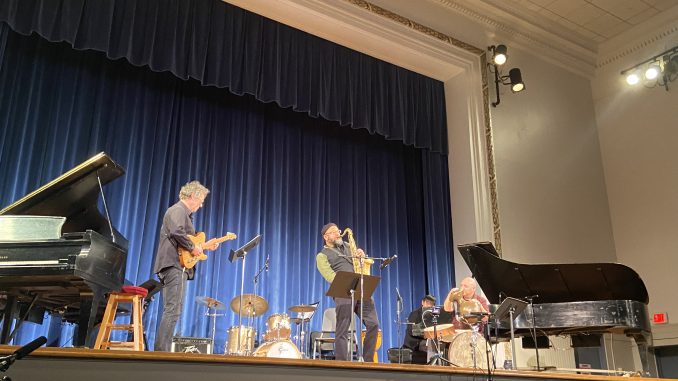
Acclaimed saxophonist and composer Hafez Modirzadeh ended his residency at SUNY New Paltz in a night of connection and composition at Studley Theatre on March 5.
Modirzadeh, a Grammy-nominated musician and scholar, was invited to SUNY New Paltz as part of the Kenneth Davenport Residency for New American Music, which brings students and contemporary American composers together for workshops, class visits, projects and performances. Modirzadeh’s ten-day residency allowed him to coach and collaborate with students and staff to not only create music, but to connect and transcend pre-existing notions about what music can be.
“I believe that what we’re doing together reflects that consciousness that goes beyond politics, beyond religion, beyond ethnicity, beyond gender, beyond music,” Modirzadeh said.
In the spirit of this idea, Modirzadeh and professor Alex Peh premiered the piece “Beyond Song” at the show together on saxophone and piano, respectively. The song was commissioned for Peh and made possible through the National Endowment for the Arts grant that he received in 2022. Although Modirzadeh wrote the piece for Peh, he dedicated the first two movements to jazz musician Sonny Rollins and the last two to his sister Rachel Quilter.
The Persian-tuned piano and dynamic saxophone of the song took the audience on a journey through empathy. When writing the piece, Modirzadeh was inspired by the idea that everyone is on the same path through time, eventually leaving this plane.
“When you’re listening to this music, it should bring about more than tolerance for the different tones that are coexisting. Begin to get an appreciation, kindness and compassion from empathy,” Modirzadeh said.
After the last movement of “Beyond Song,” students and staff premiered some of their own compositions for the first time. In this “night of premieres,” Modirzadeh bounced to and from the stage as he joined in on the new pieces.
Inspired by his work, the students composed their music and tuned their instruments in unique ways that didn’t fit the standard of Western music theory. Cross-cultural inspirations in Modirzadeh’s music contribute to the decolonization of these music “rules” and allow the music to transcend divisions. In discovering new tunings and structures together, students and professors have a sense of unity and equal footing.
“They find their own tunings and resonances, and this way, we’re all liberated. We all find a balance that is beyond hierarchy, beyond casteism,” Modirzadeh said.
After the student pieces, Modirzadeh joined jazz studies director Mark Dziuba for his piece “Take Note,” along with Peh and Brian Melick, before transitioning into his own compositions from his new album, Facets.
At the end of his last facet, Facet B’kongofon, music student Justin Ruszczycki closed out the show with a resounding drum solo. The culmination of noise and rhythm sent the audience into roaring applause, and the lessons he had learned in musical boundary breaking were striking. Modirzadeh’s brief residency was enough to tremendously expand the minds of students like Ruszczycki beyond the standard rules of Western music.
“I learned that you can really break the rules of music; you don’t have to always follow a certain form. It’s more about how it makes you feel from playing the instruments,” Ruszczycki said. “Forget everything you know and just play solely based off your emotions and what you hear.”
